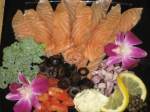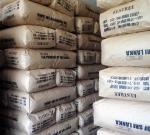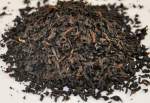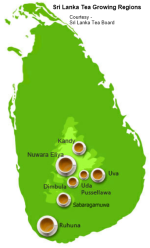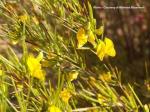
Farming Organic Loose Tea in Sri Lanka
Farming organic loose tea in Sri Lanka (Ceylon) is extremely difficult as most farms must transition from conventionally grown. Acreage must be left fallow for three to five years allowing for chemical breakdown and final testing. Lost income makes this transition harsh.
Your Loose Teas products are sustainably grown in the high regions of Sri Lanka, provide world class tea while protecting the local environment and paying fair wages.
Organic Ceylon tea farmers in Sri Lanka are leaving mono-culture agriculture as are small farmers in the US. Having a uniform crop, as is now documented, increases both disease and economic risk. Farming organic loose tea, also called Poly-culture Agriculture, acknowledges that the soil is its own ecosystem and when healthy, the soil and the plant can fend off drought, pathogens and pests lowering the use of synthetic pesticides. Failed plantation style tea farms are being converted to poly-culture farms called “Forest Gardens” using a seven canopy layer of plantings to mimic the original forest ecosystem. Dense forest is returning.
The poly-culture system for farming organic loose tea, as in nature, is adaptive when used with crop rotation. Native trees hold back soil and act as a windbreak as do pepper and cinnamon plants and Goroka trees. These plants are also cash crops.
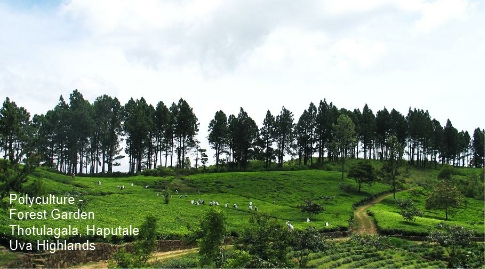 Polyculture - Plants and Animals Occupy The Land Together Growing The Soil
Polyculture - Plants and Animals Occupy The Land Together Growing The SoilTea bushes dominate the farms and continue to provide the majority of revenue, but farmers are experimenting with various cash plants. Crops include coffee, cloves, pepper vines, vanilla, ginger, turmeric, lemongrass, and citronella. Medicinal herbs include the neem tree, known as 'the village pharmacy' because of its many healing properties and whose extracts are made into a non-toxic insecticide. Farming organic loose tea is profitable, but the farmer must create other income streams to diversity the inherent biological and economic risks.
Other plants attract or repel particular insects; trees and shrubs such as eretrina and vativera provide shade from the sun and protection from rain, or are planted as low hedges to prevent soil erosion. Chillies, beans, tomatoes and brinjal (aubergine) are among the vegetables grown for home consumption and for sale at local markets.
The certification process for farming organic loose tea production is long and can cause financial hardship. However, once the farm is certified, profitability increases as the consumer is willing to pay more for a fully traceable sustainable more nutritious food product. Conventional wisdom is also difficult to change in Sri Lanka as we see in the United States.
Farming organic tea in Sri Lanka requires difficult cultural and infrastructure systemic changes.
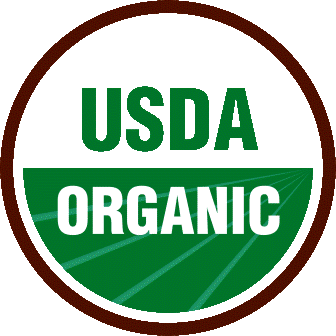 USDA Organic Green Seal
USDA Organic Green SealFarming Organic Loose Tea In Sri Lanka -
What Does Certification Mean in Layman’s Terms?
The overall methods to grow and process the agriculture product are approved and verified. The methods try to achieve profitability for the farmer, measurability of purity and nutrition of the product as described and foster an understanding that measurable, sustainable practices promote the well-being of the local environment.
Organic Ceylon tea farm certification is strenuous, mentally, physically and economically. The National Organic Program Standards are quite extensive. Food Processors must also undergo certification. Here we call both Producers.
Summary of National Organic Program Standards
- Producers must prepare an Organic Systems Plan that the certifier must review, evaluate and approve. (205.201). Producers need to implement and document proactive and preventative management practices before they can use pesticides. (205.206).
- Producers must be certified by a USDA-accredited certifying agent. (205.100) except Producers with sales under $5,000 are exempt from certification. (205.101).
- Most synthetic fertilizers, pesticides, animal drugs, feed additives, and ingredients are prohibited, but those that are allowed may be used only with restrictions. (205.105) These exceptions are in much debate in the United States.
- Land cannot be certified as “organic” until three years after the date of the application of the last prohibited material. (205.202) Residues of pesticides that result from unavoidable contamination are limited to 5% of EPA Tolerance. (205.671). This causes much hardship for farmers making the transition.
- The use of raw manure is restricted, and manure that is made into compost must meet specific process requirements. (205.203).
- Organic seeds must be planted unless they are not commercially available. (205.204). Most seed treatments are prohibited. (205.204)
- Animals must meet most of their nutritional requirements from organic feed. (205.237)
- Animal drugs cannot be applied in the absence of illness. (205.238)
- Subtherapeutic antibiotics are prohibited in livestock. (205.238)
- Livestock must have access to the outdoors, with only temporary exceptions. (205.239)
- Ruminants must have access to pasture. (205.239)
Farming organic loose tea in the highlands of Sri Lanka is extraordinarily challenging.

